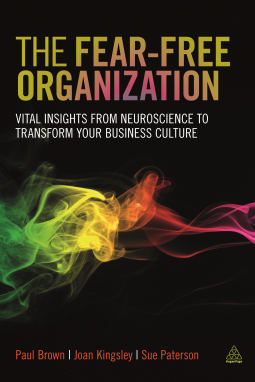
The Fear-free Organization
Vital Insights from Neuroscience to Transform Your Business Culture
by Paul Brown; Joan Kingsley; Sue Paterson
This title was previously available on NetGalley and is now archived.
Send NetGalley books directly to your Kindle or Kindle app
1
To read on a Kindle or Kindle app, please add kindle@netgalley.com as an approved email address to receive files in your Amazon account. Click here for step-by-step instructions.
2
Also find your Kindle email address within your Amazon account, and enter it here.
Pub Date 28 Jul 2015 | Archive Date 31 Aug 2015
Kogan Page Ltd | Kogan Page
Description
Leadership that makes a difference takes guts and confidence, plus belief in oneself and belief in the key players in the organization. It is built on trust, not fear. Scared people spend a lot more time plotting their survival than working productively, so TheFear-Free Organization has zero tolerance for bullies, vicious gossip, undermining behaviors, hijacking tactics, political jockeying for position or favoritism. Instead, it works on inspiration. Evidence from neuroscience shows that individuals and organizations are more successful when people are encouraged to take risks, to explore new ideas, and to channel their energies in ways that work for them. The Fear-Free Organization reveals how our new understanding of the neurobiology of the self - how the brain constructs the person - can transform for the better the way our businesses and organizations work.
Advance Praise
'Both academic and accessible...Most of all it hits the bullseye: fear is the problem and relationships of love are the solution. The sophisticated version of love, that is; the kind that creates intellectual and practical rigour and leaves us smarter and makes us better leaders.' Nancy Kline, author of Time to Think
'The jewel in the crown of all the recent books on this subject...clear authoritative exposition of the emerging understanding that neuroscience has provided together with a practical common-sense approach.' Professor Patrick Pietroni, University of Chester
'Beautifully written, clearly structured and brimming with compelling case studies.' Professor Brett Kahr, Senior Clinical Research Fellow in Psychotherapy and Mental Health, Centre for Child Mental Health, London
'All organizations suffer from elements of dysfunctionality. This book superbly explains what is really going on.' Charlie Geffen, Chair, London Corporate, Gibson Dunn and formerly Senior Partner at Ashurst
Marketing Plan
- London launch at the Reform Club
- E-Newsletters: HR/Coaching/Learning & Development and Management/Leadership/Change Management
- PR sent to the Irish Times, Forbes, People Management, Strategy+Business, HR Magazine, Management Today, Director Magazine, The HR Director, Psychology Today and more
- Coverage secured in European CEO and Thought Leaders LLC
Available Editions
| EDITION | Other Format |
| ISBN | 9780749472955 |
| PRICE | $29.95 (USD) |
Average rating from 8 members
Featured Reviews
 Sylvie Marie H, Reviewer
Sylvie Marie H, Reviewer
In this book, the authors seek to demonstrate how fear, a powerful emotion that tend to override others, gets in the way of individual performance at work. As a consequence, it also affects organizational performance negatively, and it especially damps down efforts in implementing change. One of the questions they are trying to answer is how we manage and lead in such a way as NOT to induce fear?
While reading this book, I had the following questions in mind:
Why do we need a fear-free organization?
Why does fear matter?
How do we control fear or manage its impacts?
What roles do leaders play in organizations?
How do we create and maintain organizations where individuals thrive?
How de we create and maintain organizations that perform well and who can adapt to changes in market conditions without deleterious effects on individuals?
Given the often difficult conditions in which organizations must carry out business and the need to manage ever-accelerating change (or so it often appears to individuals within organizations), it is essential to understand the underlying mechanisms that influence behaviors and relationships in order to foster the most fruitful ones.
The authors look at the neurobiological foundations of emotions, the self and the ability to learn. As an opposite of fear, trust generates more energy and leads to more positive results. Because fear is linked with survival and because the brain associates change with a threat to stability, we can conclude that human beings are hard-wired to resist change and to fight for the maintenance of status quo. The authors suggest means to create a context where fear is mastered in order to attain desired change.



